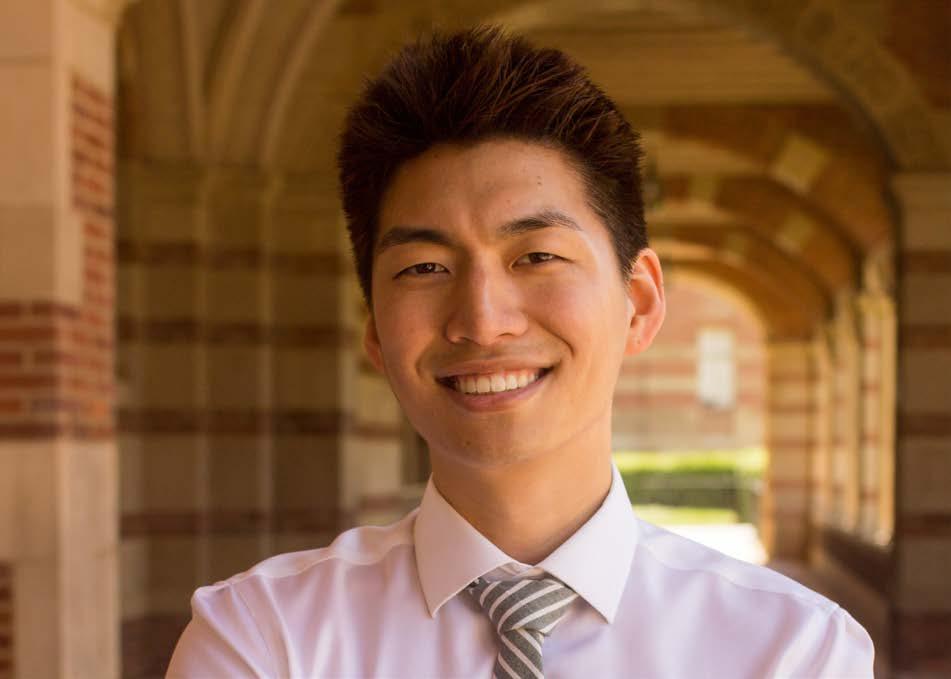
4 minute read
Andy Liu receives Honorable Mention from NSF GRFP
Andy Liu
GRADUATE DISTINCTIONS
As noted in the previous article, 11 University of Utah graduate students were awarded the National Science Foundation’s Graduate Research Fellowship Program (NSF GRFP) for 2021. Fourteen other U graduate students received an Honorable Mention from the NSF.
Andy Liu is one of those who received an Honorable Mention. He is a graduate student in the Department of Mathematics, working on a Ph.D. in mathematical biology.
Tell us about your research.
“I’m interested in using a branch of machine learning called ‘reinforcement learning’ to better understand the function of biological brains. My goal is to explain why intelligent agents perform tasks that are indirectly related to their goals (called auxiliary tasks) and how we can replicate those tasks to improve artificial intelligence performance.
“To understand this, look at babies and young children. They play with intense curiosity, challenging themselves and developing an understanding of how the world works. Without any definite goals, they can become adept at physics, language, and even abstract thinking. What drives them? How do they decide what they are interested in or when to give up?
“Research in robotics has shown that allowing an artificial intelligence (AI) to play just like a baby— without any goals or desired outcome—helps us develop a much more masterful AI—one that is more robust than one trained on only one task. I believe that programming more general AI with this kind
of intrinsic motivation and curiosity will allow it to learn more effectively. Studying how the AI responds to different ways of learning will teach us about ways we can improve or enhance our own teaching and learning capabilities.”
What does receiving recognition from the NSF mean to you?
“I’ve wanted to study intelligence for a long time but was always told that the big picture ideas I’m interested in are impossible to study. Receiving an honorable mention from the NSF means a lot to me because it’s confirmation that my ideas are worth pursuing. It’s like hearing a respected source say, ‘Go, and show us what you’ve got!’”
What do you like about math?
“There are a ton of things I like about it! I like how we can start with a few definitions and assumptions and play with them to create new knowledge. I like how the same math problems can be approached from different angles to allow us to learn new things in the process. Most of all, I like how the same mathematical concept will appear in nature over and over in different contexts, as if math gives us the language to listen to the world.”
Where did you study as an undergraduate?
“I received my undergraduate degree in mathematics from the University of California, Los Angeles. One of my professors obtained her Ph.D. from the University of Utah and spoke highly of it. With my interest in biologically inspired intelligence, I was attracted to the math biology program here at the U. After I visited, saw the friendly atmosphere, and met with Dr. Alla Borisyuk (who has since become my advisor), I knew this was the place for me!”
Long-term career plans?
“I’m still early in my Ph.D. life, so I think what happens moving forward depends on how my research goes. I want to pursue a doctorate because I have ideas about studying intelligence that I want to try. I plan to continue my research until I’m satisfied that I’ve given it and my ideas the time and space they deserve.”
Isaac Martin Awarded NSF Fellowship continued from page 9
What do you plan to study at UT Austin?
“When I begin my Ph.D. program at UT Austin, I intend to pivot into a different area of algebraic geometry. Specifically, I hope to study mirror symmetry and tropical geometry. Mirror symmetry is a branch of algebraic geometry that is motivated heavily by string theory and quantum field theory. In recent years this has been studied in conjunction with tropical geometry, particularly through the GrossSeibert program.
“At this point in my studies, I know far less about mirror symmetry than I do about F-singularities, in no small part because the barrier to entry is quite high. Nevertheless, I’m quite excited by the prospect of working in this area because it features connections to many different subfields of math, including algebraic geometry, differential geometry, and complex geometry. Even more exciting to me is that this area of study stems from string theory and may one day provide answers to some of the biggest questions in theoretical physics, potentially changing our perception of the universe. This topic fits perfectly with my desire to work as a mathematician, while still aiding research in theoretical physics. In many ways, I couldn’t ask for a better area of research!
“Interestingly, two of the biggest active researchers in the area—Mark Gross and Bernd Seibert—are professors at Cambridge and UT Austin, respectively. I will begin reading with both Gross and Seibert over this summer. After that, I hope to write a Part III essay with Gross during my year at Cambridge. By the fall of 2022, I hope to have developed the requisite background to begin actively conducting research in mirror symmetry and tropical geometry. I’m looking forward to it all.”










